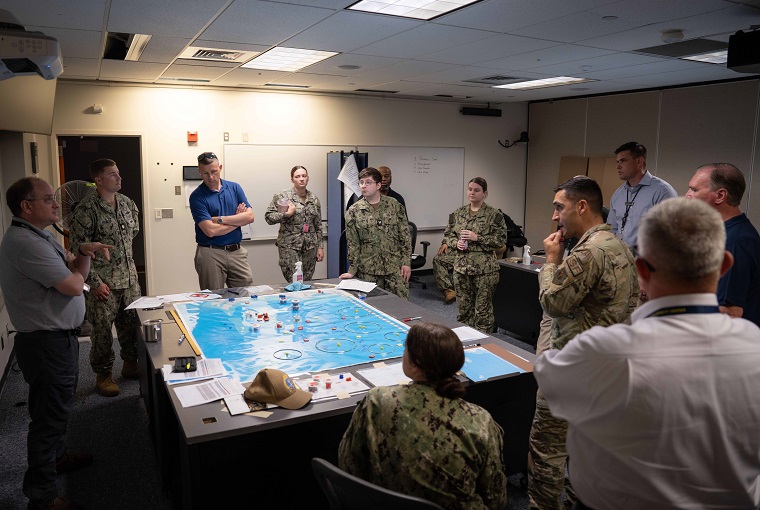U.S. Naval War College Hosts 10th Wargaming 101 Course

Newport, R.I. - The U.S. Naval War College (NWC) Wargaming department held the 10th iteration of its “Wargaming 101” introductory course, onboard Naval Station Newport, Aug. 1-10.
The academic course is designed to provide critical insight into how and why leaders make decisions in the context of maritime warfare.
“Wargaming promotes a habit of mind for warfighters,” said Capt. Mike O’Hara, chair of NWC’s Wargaming department. “It improves decision making under risk and uncertainty. Its power stems from competing against a thinking adversary -- a ‘red team’ -- trying to accomplish its objectives while seeking to undermine your own.”
A collaborative endeavor with NWC’s Joint Military Operations (JMO) department, the course provided 34 NWC faculty and staff members, representatives from different Department of Defense (DoD) entities, and government civilians representing various non-DOD agencies the opportunity to collectively analyze how wargaming can be applied effectively in diverse and challenging environments.
Participating organizations included entities such as the Office of Naval Intelligence (ONI), the U.S. Space Command, the United States European Command, the North American Aerospace Command, the U.S. Air Force 502 Security Forces Group, the Joint Enabling Capabilities Command (JECC), the Navy’s Modeling and Simulation Office (NMSO) and the Navy Warfare Development Command (NWDC).
Wargaming is an integral part of NWC’s academic programs, providing value through knowledge creation and fusing Wargaming department’s applied gaming, research and analysis methods with JMO department’s operational art and planning curriculum.
The Wargaming 101 course originated as in-house training for incoming faculty and staff, but has been broadened in the last five years to include outside organizations, including non-DoD entities such as the U.S. Congress, State Department, and U.S. Coast Guard, reflecting a growing interest in wargaming as a useful tool for analysis of national security issues.
“Wargaming 101 provides a wealth of techniques and resources that are well suited to analyzing conflict, anticipation, prevention, and post-conflict stabilization issues we look at in Europe,” said Aaron Daviet, stabilization advisor at U.S. European Command (EUCOM) where he synchronizes support efforts to prevent and resolve conflict.
Over the 10-day period, presenters offered a series of wargaming classes and practical application activities to help new faculty build and communicate content effectively.
Co-directors Shawn Burns, Ed.D., NWC professor and wargame director, and Richard Wilbur, NWC wargaming specialist, aided by their JMO colleagues, applied their experience in defense and wargaming to design simulated scenarios.
“Our students leave us armed with NWC’s wargaming methodology, techniques, tips, and suggestions to apply and adapt to the specific needs of their respective commands," said Burns. “Their qualifications include researching, creating, and analyzing games to address real military problems confronting senior leaders.”
NWC’s Wargaming department conducts high-quality applied gaming, research, analysis, and education. Simulating these complex scenarios builds analytical, decision-making, and risk assessment skills.
NWC delivers excellence in education, research, and outreach, informing today’s decision-makers and educating tomorrow’s leaders. The college provides educational experiences and learning opportunities that develop students’ ability to anticipate and prepare strategically for the future, strengthen the foundations of peace, and create a decisive warfighting advantage.
